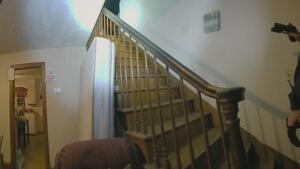Featured video
Fugitives: Caught on Tape - Police Pursue Shoplifting Suspect
After a shoplifting call at a sporting goods store, officers attempt to detain a woman who flees, in this scene from Season 2, Episode 15.
This day in crime
12.25.1951
NAACP activists Harry and Harriette Moore murdered in their Florida home

12.25.1951
Harry and Harriette Moore were early activists for the NAACP in Florida who became martyrs for the cause when a bomb was placed under their bedroom floor that went off on Christmas night, killing them both. The attack happened weeks after Harry had called for a local sheriff to be indicted on murder charges for killing a Black suspect falsely accused of rape. While five police investigations identified four Ku Klux Klan members as potential suspects in the bombing, no arrests were ever made.
Notorious Cases
Notorious Cases

How El Chapo’s Sons, ‘Los Chapitos,’ Became the Face of a New Drug War
Joaquín and Ovidio Guzmán López modernized the Sinaloa cartel.

Did Ed Gein Date Bernice Worden Before Killing Her?
The hardware store owner's murder led to Gein's arrest in 1957.

Inside Bryan Kohberger’s Life in Prison, Where Other Inmates Taunt Him Through the Air Vents
The PhD student killed four University of Idaho students in 2022.
Crime on the Screen
Crime on the Screen

From 'Chicago' to 'Dead Outlaw': All the Broadway Shows Inspired by Real Crimes
Leo Frank, Elmer McCurdy and more had their tales told on stage.

The 'Onion Field' Killing: How the Murder of 1 LAPD Officer Forever Changed American Policing
A routine traffic stop in 1963 quickly spiraled.

Looking Back on the Legacy of 'The Naked Gun'—and O.J. Simpson's Involvement
The late NFL star’s role affects how fans remember the franchise.
Crime Solving & Forensics
Crime Solving & Forensics

How DNA Solved the Yogurt Shop Murders
Why it took decades to implicate Robert Eugene Brashers.

Which Missing Persons Alerts Exist Besides AMBER? Inside America’s Alert Network
A nationwide network exists to protect seniors, police and more.

A Smoothie Straw IDed a Suspect 40 Years After a Long Island Teen’s Murder
DNA advances led to a new lead in Theresa Fusco's 1984 murder.
Law & Justice
Law & Justice

How Often Do Medical Mishaps Occur in U.S. Prisons?
R.Kelly claimed North Carolina prison staff led him to overdose.

'Starved Rock Killer' Chester Weger Died After Being Granted Parole Following 23 Denials
His three victims were bludgeoned more than 100 times.

An A.A. Confession Led to a Conviction in New Year’s Eve Murder a Man Committed While Blackout Drunk
Paul Cox confessed to killing Lakshman and Shanta Chervu in 1988.
Where to Find A&E

Crime Central
True crime, all the time. Stream 2,000+ episodes of chilling true crime series.

A&E Apps
Watch your favorite A&E shows anywhere, anytime.






























